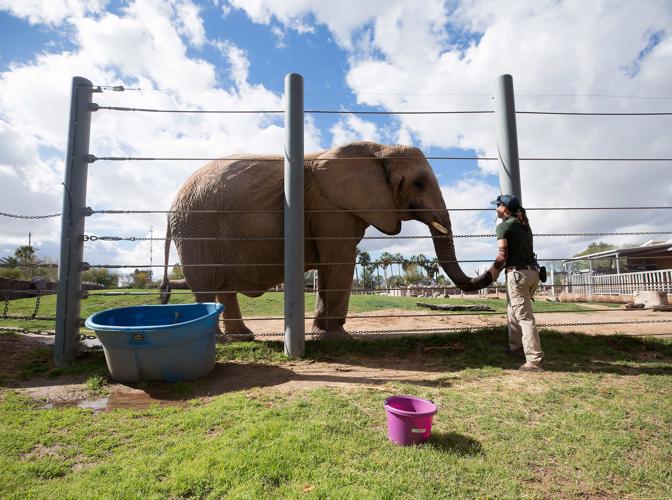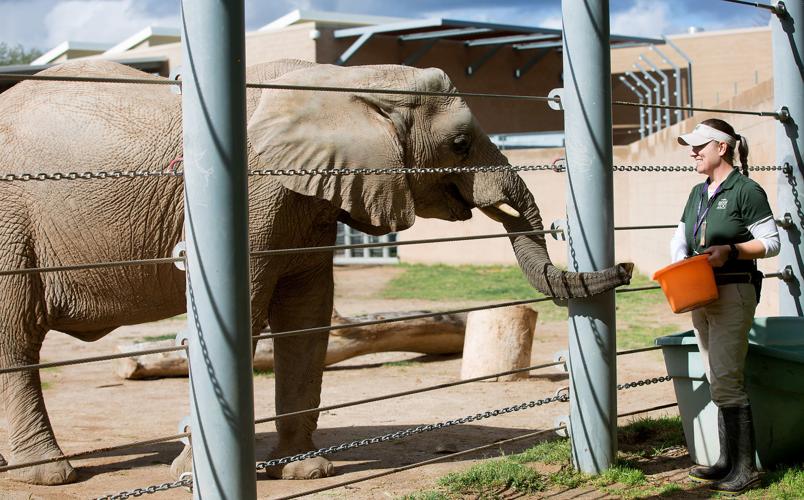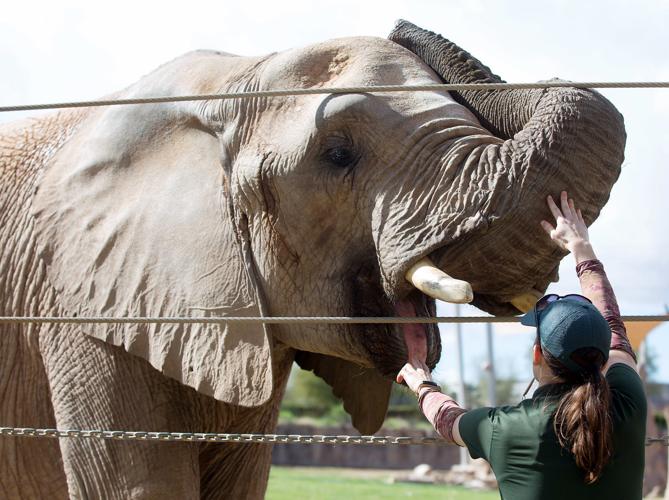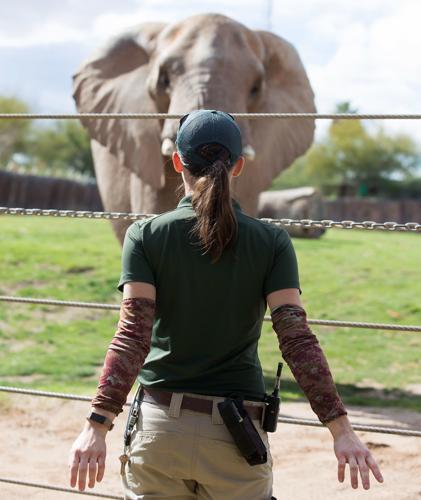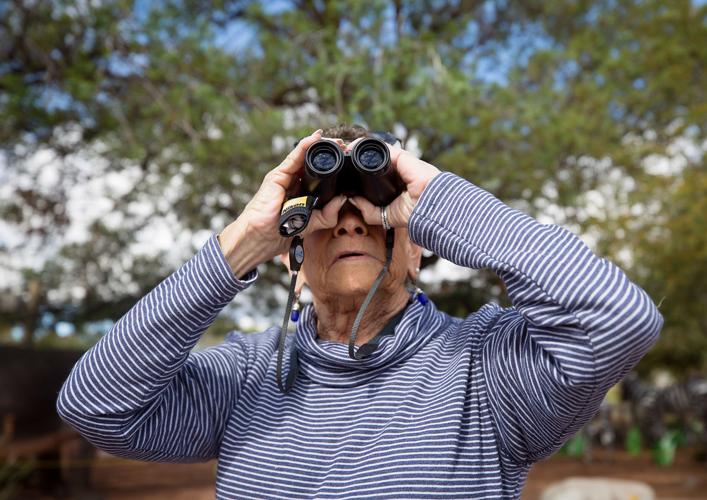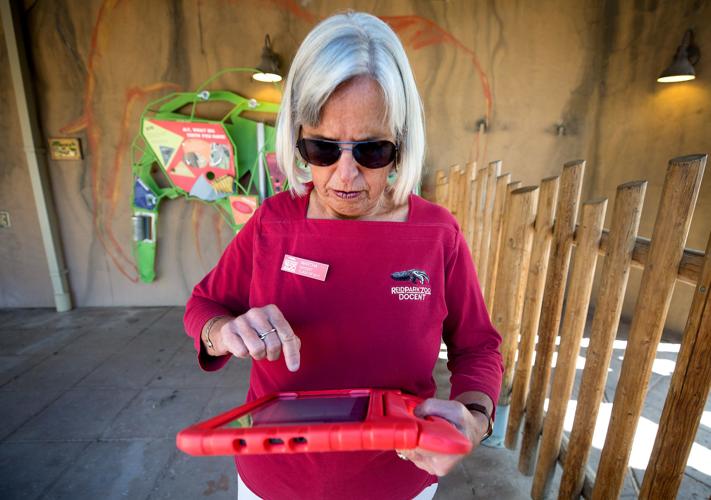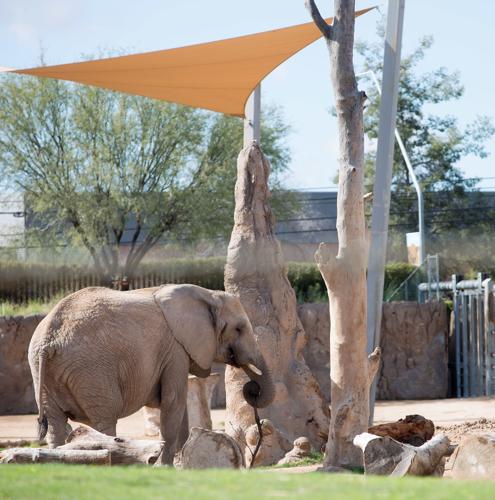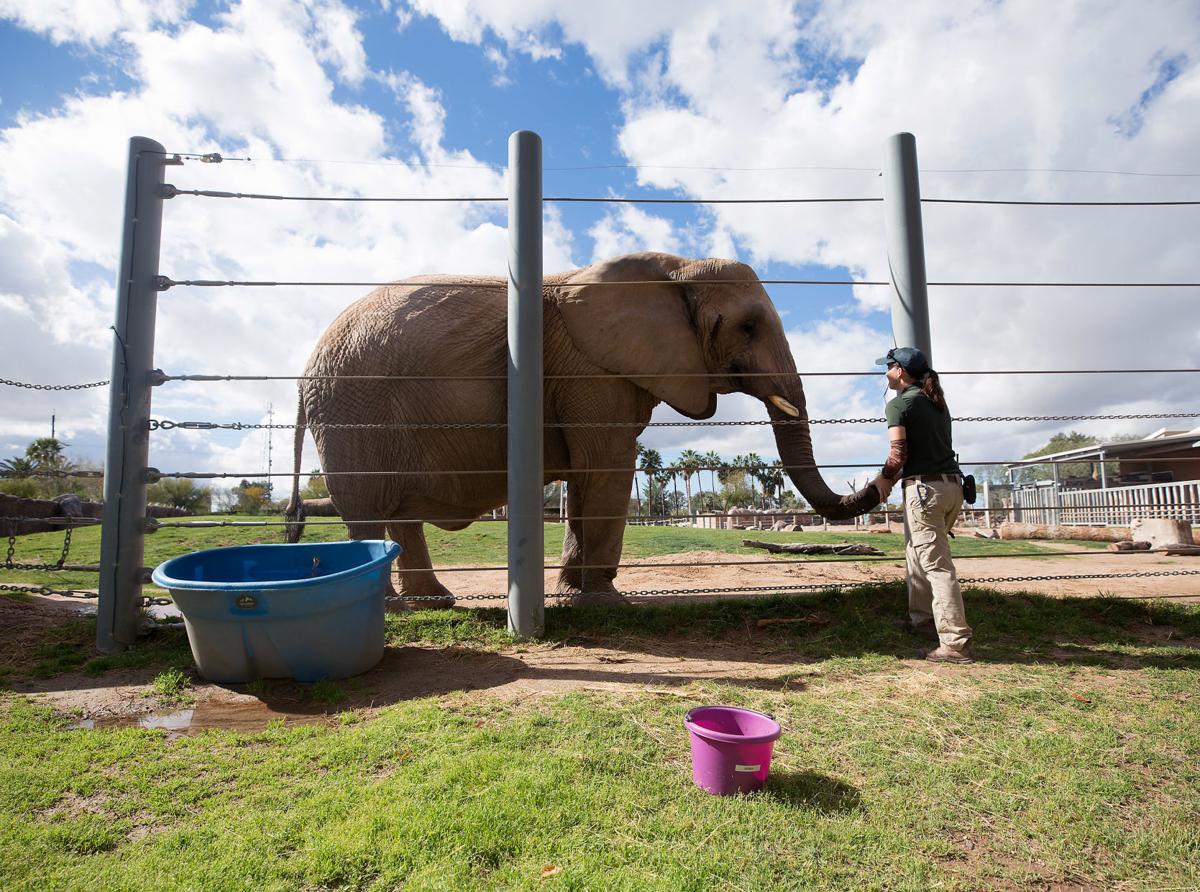Ann Forsberg-Doyle, a volunteer docent at Reid Park Zoo, holds a pair of binoculars up to her eyes.
“She’s found more grass,” the docent of 12 years says, as she watches 30-year-old elephant Semba. “That girl loves to eat.”

Ann Forsberg-Doyle, a docent, keeps watch on Semba, who is due to give birth by mid-April. Semba’s movements and behavior are recorded every five minutes around the clock.
Semba is currently pregnant and expected to give birth any day now. The baby will join Semba, 30-year-old father Mabu, 29-year-old aunt Langile, 9-year-old brother Sundzu and 5-year-old sister Nandi.
“The whole elephant team is the most excited to share this baby with the community,” says elephant supervisor Cassie Dodds. “With everything going on in the world, we want this baby elephant to bring encouragement and hope to people.”

Semba, an African elephant, walks around her enclosure at the Reid Park Zoo on March 12, 2020. Semba is currently pregnant and is due sometime in mid-April. The sex of the calf is unknown.
Nandi was the first elephant born in Arizona, instantly stealing the hearts of Tucsonans. She’s known to be more high-spirited, director of zoo operations Sue Tygielski says, so keepers aren’t quite sure what kind of big sister she’ll be.
“Her older brother Sundzu has a wonderful, gentle demeanor,” Tygielski says. “He played with Nandi so carefully (when she was younger). If his mom thought he was too close, he would back away immediately.”
Tygielski says female elephants tend to be more nurturing — but maybe not Nandi.
“I’m wondering if Nandi will be likely to play rough and get disciplined by her mom,” she says, adding that she expects Nandi to be curious about the baby but to possibly spend more time with Langile.

Zookeepers will be watching to see how Nandi behaves as a big sister. Female elephants tend to be more nurturing, but the boisterous 5-year-old might be an exception, says zoo director Sue Tygielski (not pictured).
An elephant’s pregnancy is about two years long and zoo workers found out Semba was pregnant about four months in. After waiting more than a year, the baby is finally expected by mid-April.
That means Reid Park Zoo staffers are now in baby watch — which may be more intensive than you’d think.
Semba has someone watching her every move — and writing observations every five minutes — 24 hours a day, seven days a week for about two months.
From outside of the elephant habitat, docents carry around a tablet, which beeps every five minutes, alerting them to jot down where Semba is and what she’s doing — usually it’s something like eating or walking.
The monitoring continues behind the scenes, too.

Zoo docent Martha Hendricks records a mealtime for Semba. The tablet she’s carrying beeps every five minutes, alerting her to jot down what the expectant mom is up to.
Several times a day, keepers use enrichment activities to engage with all five of the zoo’s elephants. The elephants are trained to lift their legs, kneel, and open their mouths, among other tricks that allow keepers to make sure they’re healthy.
And the elephants are rewarded with snacks: hay, cucumbers, zucchini or lettuce.
Other enrichment activities provide exercise for the elephants, especially for Semba. A hay net that hangs high in the elephants’ barn helps Semba tighten her core as she reaches for the hay inside.
Keepers are also able to collect urine samples from Semba, which she’s trained to provide voluntarily. They also take blood samples and monitor the amount of sleep she gets, among other things, especially any indicators that she could be going into labor.

Semba and her family have been trained to lift their legs, kneel, and open their mouths. Each of these tricks helps zookeepers evaluate their health.
“Our biggest concern is keeping Semba healthy,” Dodds says.
Although the monitoring is intensive, little is known about the baby — including the gender. But rest assured, when the baby arrives, Reid Park Zoo will alert the community.
The public was able to see Nandi, from a distance at least, about a week after she was born. Tygielski isn’t sure when the public will be able to see the calf, but she thinks it’ll be a week or two after it’s born.
Semba and the baby will still be monitored 24/7 for the first five to six weeks after birth, as keepers track things like the baby’s weight, how often the baby nurses, and the baby’s “firsts.”

Shelby Maerling, an elephant care professional at the Reid Park Zoo, conducts her morning routine health check on Semba, an African elephant, on March 12, 2020. With arm gestures, Maerling has Semba walk backwards. Semba is currently pregnant and is due sometime in mid-April.
“For the first few months of a calf’s life, we watch his or her development skills,” Tygielski says. “They can keep up with mom — they have to — but they’re a little bit uncoordinated. They have challenges when climbing and they lack good coordination. Their trunk is like a piece of floppy spaghetti — it takes some time to learn to use it.”
Semba’s pregnancy is the result of recommendations through a species survival plan and Tygielski says the pregnancy is a good sign of overall health of the herd.
“They don’t have offspring if they’re not healthy,” she says.
Zoo workers are also hoping to use the birth as a way to further elephant conservation and educate the public of poaching and loss of habitat.
“This precious baby elephant will help us inspire connections between people and elephants, therefore allowing us to share the story that is critical to their survival,” Dodds says.
Related gallery: Readers' 2015 photos of baby Nandi
Readers' photos of Baby Nandi
Readers' photos of Baby Nandi
Updated
Nandi on her first birthday playing with paper.
Readers' photos of Baby Nandi
Updated
Nandi sprays mud.
Readers' photos of Baby Nandi
Updated
Nandi in the water with brother Sundzu.
Readers' photos of Baby Nandi
Updated
Readers' photos of Baby Nandi
Updated
Readers' photos of Baby Nandi
Updated
Nandi with father Mabu.
Readers' photos of Baby Nandi
Updated
Nandi's first birthday celebration. Photo by Barbara Beach.
Readers' photos of Baby Nandi
Updated
Nandi's first birthday celebration. Photo by Barbara Beach.
Readers' photos of Baby Nandi
Updated
Nandi's first birthday celebration. Photo by Barbara Beach.
Readers' photos of Baby Nandi
Updated
Nandi's first birthday celebration. Photo by Barbara Beach.
Readers' photos of Baby Nandi
Updated
Nandi's first birthday celebration. Photo by Barbara Beach.
Readers' photos of Baby Nandi
Updated
Taken Dec. 19, 2014, by Pamela Samuels.
Readers' photos of Baby Nandi
Updated
Taken Dec. 19, 2014, by Pamela Samuels.
Readers' photos of Baby Nandi
Updated
Taken by Sharon Pairman.
Readers' photos of Baby Nandi
Updated
Taken by Sharon Pairman.
Readers' photos of Baby Nandi
Updated
Taken by Sharon Pairman.
Readers' photos of Baby Nandi
Updated
Taken by Sharon Pairman.
Readers' photos of Baby Nandi
Updated
Taken by Sharon Pairman.
Readers' photos of Baby Nandi
Updated
Taken by Sharon Pairman.
Readers' photos of Baby Nandi
Updated
Taken Sept. 27, 2014 by Chris Tanz.
Readers' photos of Baby Nandi
Updated
Taken Sept. 27, 2014 by Chris Tanz.
Readers' photos of Baby Nandi
Updated
Taken Sept. 27, 2014 by Chris Tanz.
Readers' photos of Baby Nandi
Updated
Taken Sept. 28, 2014 by Chris Tanz.
Readers' photos of Baby Nandi
Updated
Taken Sept. 28, 2014 by Chris Tanz.
Readers' photos of Baby Nandi
Updated
Taken Nov. 16, 2014 by Chris Tanz.
Readers' photos of Baby Nandi
Updated
Taken Nov. 16, 2014 by Chris Tanz.
Readers' photos of Baby Nandi
Updated
Taken Sept. 21, 2014. Even then she was trying to imitate Mama. By Fran Kelly.
Readers' photos of Baby Nandi
Updated
Taken Nov. 28, 2014, by Norita Nickerson.
Readers' photos of Baby Nandi
Updated
Taken Nov. 28, 2014, by Norita Nickerson.
Readers' photos of Baby Nandi
Updated
My husband is a woodworker and created this treasure chest, surprising me with a beautiful carving of baby Nandi. By Norita Nickerson.
Readers' photos of Baby Nandi
Updated
Photo by Walter Godwin.
Readers' photos of Baby Nandi
Updated
Photo by Walter Godwin.


